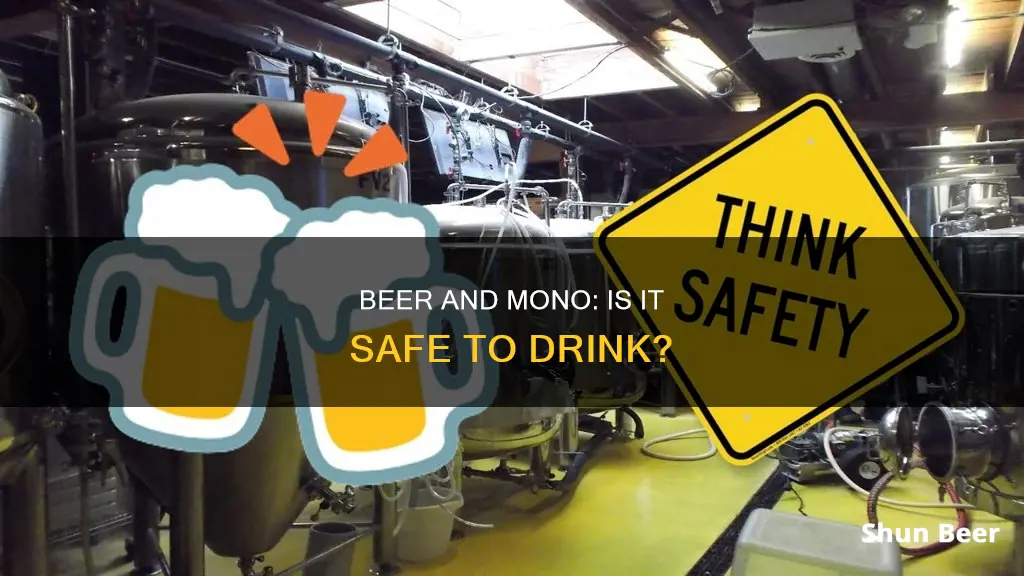
Drinking alcohol when you have mono is not recommended, as both mono and alcohol affect the liver, and consuming alcohol while sick with mono could lead to liver damage. Mono, or mononucleosis, is a viral infection that is common among young people and is often spread through saliva, which is why it is nicknamed the kissing disease. While mono often causes minimal symptoms in children, adolescents and young adults can experience more intense symptoms such as fatigue, fever, headache, muscle aches, and a sore throat. The most important thing to do when sick with mono is to get plenty of rest and avoid alcohol for a few months, even after you start feeling better.
| Characteristics | Values |
|---|---|
| Drinking alcohol when having mono | Not recommended due to the risk of liver damage |
| Mono's effect on the liver | Liver inflammation |
| Alcohol's effect on the liver | Potential liver injury |
| Seeing a doctor | Strongly advised |
| Alcohol avoidance duration | A few months, even after symptoms disappear |
What You'll Learn

Drinking alcohol with mono can lead to liver damage
Drinking alcohol while you have mono is not recommended, as it can lead to liver damage. Mono, or mononucleosis, is a viral infection that commonly affects young people, and it is caused by the Epstein-Barr virus (EBV). This virus is spread through saliva, which is why mono is often called the "kissing disease."
The liver is a vital organ that performs many functions in the human body, including filtering toxins from the blood, regulating blood sugar and cholesterol levels, aiding digestion, and fighting infection and disease. When a person consumes alcohol, some liver cells die, and the liver works to regenerate new ones. However, heavy and prolonged alcohol consumption can reduce the liver's ability to regenerate, leading to serious and permanent damage.
Mono can also affect the liver. The virus may cause inflammation in the liver, and consuming alcohol while having mono can further injure the organ. Therefore, it is crucial to avoid alcohol when you have mono to prevent potential liver damage. Even after recovering from mono, it is advisable to refrain from alcohol for a few months to ensure the liver has time to heal completely.
Alcohol-related liver disease (ARLD) is a common condition, with increasing cases due to rising alcohol misuse. It often presents no symptoms until the liver has been severely damaged. Some signs of ARLD include jaundice, swelling in the ankles and abdomen, confusion or drowsiness, and vomiting blood or passing blood in stools. ARLD can progress to cirrhosis, a severe and irreversible stage of liver scarring that significantly impairs liver function.
In summary, drinking alcohol while having mono can increase the risk of liver damage due to the combined effects of the virus and alcohol on the organ. It is essential to listen to your body and prioritize your health by abstaining from alcohol until you have fully recovered from mono.
Drinking Beer from Mason Jars: Is It Okay?
You may want to see also

Mono affects the liver, so alcohol should be avoided
Drinking alcohol is known to have health risks. When you have mono, drinking alcohol can be especially harmful because mono and alcohol both affect the liver. Mono can cause liver inflammation, or hepatitis, and research suggests that as many as 14% of people infected with the Epstein-Barr virus (EBV), the main virus responsible for causing mono, experience some liver enlargement.
Since mono affects the liver, drinking alcohol while having mono could lead to liver damage. This is because the liver is responsible for processing alcohol and breaking it down so that it can be eliminated from the body. When someone has mono, their liver is already compromised, and adding alcohol to the mix can overload the liver and impair its ability to function properly.
Alcohol is broken down in the liver primarily by enzymes, including alcohol dehydrogenase and aldehyde dehydrogenase. These enzymes convert alcohol into acetaldehyde, a toxic compound, and then into acetate, which is further metabolized to carbon dioxide and water. In a healthy liver, these enzymes work efficiently to detoxify and eliminate alcohol from the body.
However, when the liver is already inflamed due to mono, the process of alcohol metabolism can put additional strain on the liver, potentially leading to more severe inflammation and damage. This damage can range from mild liver enzyme elevations to more severe conditions such as alcoholic hepatitis or even acute liver failure in extreme cases.
Therefore, it is crucial for individuals with mono to avoid alcohol consumption. This avoidance should continue for a few months, even after the initial symptoms of mono have subsided. By refraining from alcohol, individuals can give their liver the time it needs to heal and recover from the effects of mono, thus reducing the risk of further complications and ensuring a healthier outcome.
Beer and Breastfeeding: Is It Safe to Drink Alcohol?
You may want to see also

Mono is caused by the Epstein-Barr virus (EBV)
Infectious mononucleosis, or mono, is a contagious disease most commonly caused by the Epstein-Barr virus (EBV). EBV is one of the most common human viruses in the world and spreads through bodily fluids, primarily saliva. It can also spread through blood and semen during sexual contact, blood transfusions, and organ transplants.
Most people with mono will recover in 2 to 4 weeks, but some may experience fatigue for several more weeks or even months. Symptoms of mono usually appear 4 to 6 weeks after infection and may include headaches, body aches, and swollen lymph nodes in the neck and armpits. Less commonly, mono may also cause a swollen liver or spleen, or both.
While there is no specific treatment for mono, staying hydrated, getting plenty of rest, and taking over-the-counter medications for pain and fever can help relieve symptoms. It is important to avoid contact sports until fully recovered, as there is a risk of spleen rupture.
EBV is the most common cause of mono, but other viruses can also cause this disease, including cytomegalovirus (CMV) and hepatitis A, B, or C. Typically, mono is diagnosed based on symptoms, but laboratory tests may be needed for patients who do not have a typical case.
In terms of prevention, there is currently no vaccine available for mono or EBV infection. However, individuals can reduce their risk of infection by avoiding close contact with infected individuals, not sharing drinks or personal items, and practising good hygiene.
Beer and Braces: What You Need to Know
You may want to see also

Mono is spread through saliva, hence its nickname, kissing disease
Drinking alcohol is not recommended for people with mono, as both mono and alcohol affect the liver, and consuming alcohol while infected with mono could lead to liver damage. Mono, or mononucleosis, is a viral infection that is usually caused by the Epstein-Barr virus (EBV) and is spread through contact with saliva, earning it the nickname "the kissing disease".
The Epstein-Barr virus is transmitted through bodily fluids, most commonly saliva, which is why mono is often referred to as the "kissing disease". It is also spread through the sharing of drinks, eating utensils, toothbrushes, and other personal items that may have saliva on them. In addition, mono can be transmitted through coughing, sneezing, blood transfusions, and sexual contact, although these are less common modes of transmission.
The virus that causes mono can remain in a person's saliva for months after the initial infection, even if they are not experiencing any symptoms. This means that an infected person can unknowingly spread the virus to others through kissing or sharing saliva-contaminated items. Therefore, it is important for people with mono to avoid close contact with others, especially kissing, and to refrain from sharing drinks, utensils, or other personal items during their illness and for several months after recovery.
The incubation period for mono can last up to two months, during which an infected person may be contagious but not exhibit any symptoms. Once symptoms appear, they typically include a sore throat, swollen tonsils, swollen lymph nodes in the neck, and possibly belly pain due to an enlarged liver or spleen. While mono usually resolves on its own within 2 to 4 weeks, fatigue and weakness can persist for several weeks or even months afterward.
Beer and Breastfeeding: What's Safe?
You may want to see also

Symptoms of mono include fatigue, fever, headache, and muscle aches
Infectious mononucleosis, or mono, is a contagious disease caused by the Epstein-Barr virus (EBV). It is spread through bodily fluids, especially saliva, and can also be contracted by sharing drinks, food, or utensils with someone who has mono. Symptoms of mono typically appear 4 to 6 weeks after infection, and while they usually develop slowly, they may not all occur simultaneously.
Symptoms of mono include fatigue, fever, headache, and body aches. Fatigue can persist for several weeks after other symptoms have subsided, and occasionally, symptoms can last for 6 months or longer. Other signs of mono include swollen lymph nodes in the neck and armpits, and a swollen spleen and/or liver, though these are less common. An enlarged spleen is a potentially serious complication of mono, and in extreme cases, it can rupture, causing sharp pain in the upper left abdomen, which requires immediate medical attention.
Given that mono affects the liver, drinking alcohol while having mono could lead to liver damage. Therefore, it is recommended to avoid alcohol until fully recovered, even after the initial symptoms have subsided.
If you are experiencing symptoms of mono, it is important to seek medical advice and get plenty of rest and fluids.
Left-Out Beer: Drink or Ditch?
You may want to see also
Frequently asked questions
No, it is not advisable to drink beer or any other form of alcohol if you have mono. Both mono and alcohol affect the liver, and drinking alcohol while having mono could lead to liver damage.
Mononucleosis, or mono, is a viral infection that is common among young people. It is often spread through saliva, which is why it is nicknamed the "kissing disease". Mono is caused by the Epstein-Barr virus (EBV), which stays dormant in the body and occasionally becomes active without causing any symptoms.
The first symptoms of mono usually include fatigue, fever, headache, and muscle aches. After a few days, a sore throat and enlarged lymph nodes in the neck may develop. Other possible symptoms include loss of appetite, nausea, joint aches, rash, and abdominal pain.
If you have mono, it is recommended to avoid alcohol for a few months, even after you start feeling better.







